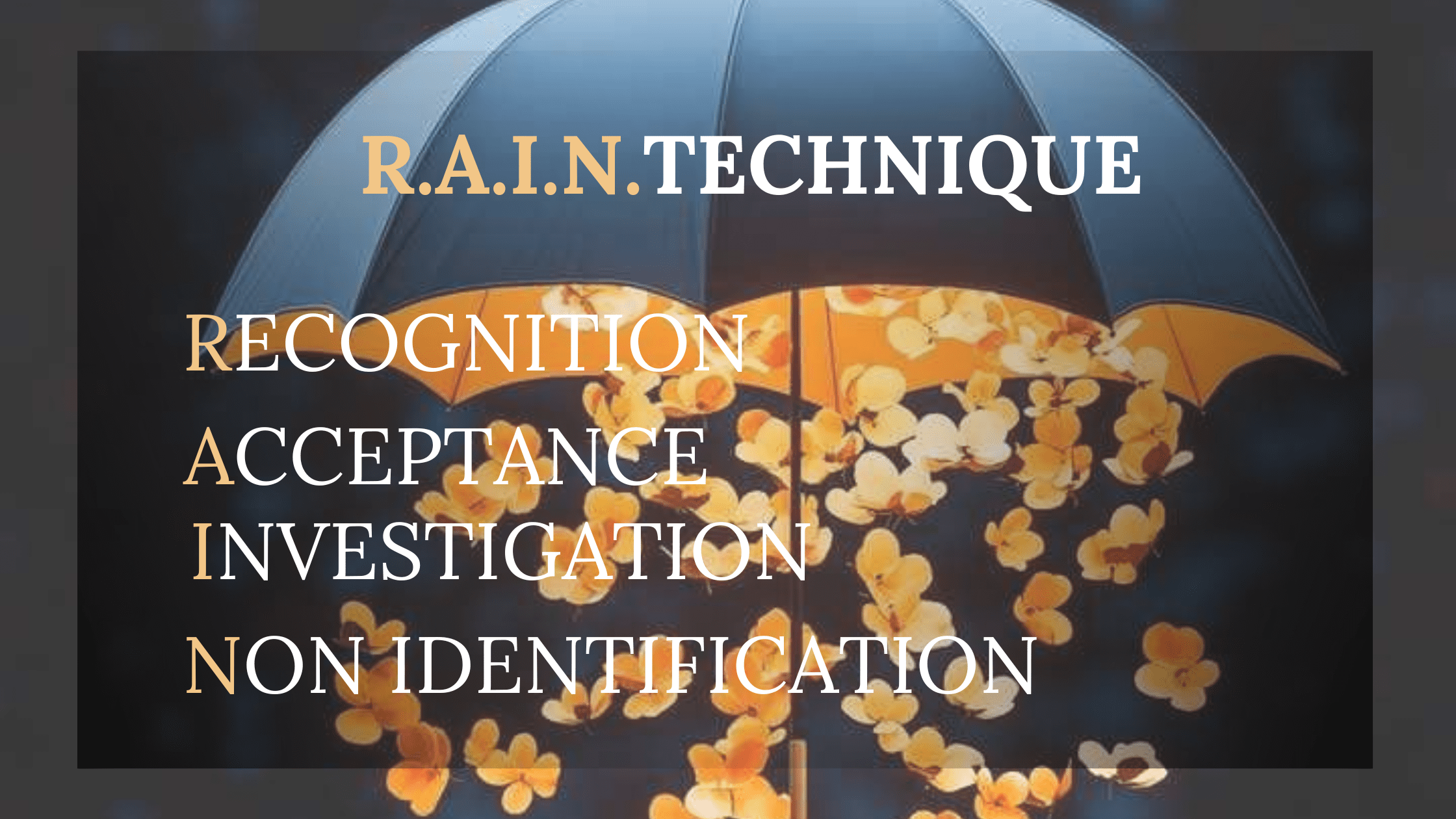We all face the battle of negative emotions at some point, whether it’s anger, fear, or sadness. These feelings can quickly take over, making it hard to think clearly. But with the right mindset and tools, you can regain control and manage your emotions more healthily.

EMOTION VS REACTION
Can you recall how many times a strong negative emotion led to a reaction that triggered an explosive situation?
How many times have you been unable to stop such a reaction?
No one is immune to negative emotions, but how you react can help prevent, alter, or lessen their intensity.
Mindfulness is a powerful practice that creates a pause between an emotion and a reaction. It helps you recognize your mental and physical state, gaining a deeper understanding of your emotional responses.
When you create that pause between your emotion and the reaction to it, your words and actions are less likely to harm yourself or others.
Your body responds emotionally and unconsciously to environmental triggers and changes. Ignoring or repressing a negative emotion doesn’t prevent its consequences, instead, it often amplifies them.
Being aware of your emotions means recognizing, feeling, and allowing them to pass without giving them control or triggering negative responses.
Emotions are temporary. While you have encountered countless of them throughout your life, they have all faded with time. Yet, in the moment, they can feel never-ending.

CONQUER THE BATTLE OF NEGATIVE EMOTIONS WITH A FOUR-STEP PROCESS
A Mindfulness method that can help you work consciously with the battle of negative emotions is R.A.I.N, the acronym that comes from:
R.- RECOGNITION
A.- ACCEPTANCE
I.- INVESTIGATION
N.- NON-IDENTIFICATION
The R.A.I.N. method, developed by Michele McDonald, is a powerful technique used in Buddhist meditation and by mindfulness practitioners worldwide. This method helps you process negative emotions and respond mindfully in challenging situations, providing a practical approach to emotional awareness.
RECOGNITION
What is happening?
In this first step, the goal is to identify and label the emotion you’re experiencing, whether it’s anger, fear, sadness, guilt, or any other emotion. Naming the emotion, you create a moment of pause, allowing you to step back and observe without being immediately swept away by it.
This simple act of recognition helps you understand what’s happening inside you and enables you to respond more calmly and intentionally.
ACCEPTANCE
Can you accept what is happening?
From a Mindfulness perspective, all emotions are authentic and essential to the human experience. They are rooted in the present moment and offer insight into our desires, needs, and fears.
While it may not always be easy to welcome a difficult emotion acceptance is key to moving through it.
Mindfulness encourages you to accept what is happening with compassion, without judgment or feelings of shame, guilt, or fear.
Sometimes, the acceptance process is not easy, but don’t get discouraged if it doesn’t work. It’s important to be patient with yourself and keep practicing.

INVESTIGATION
Are you curious about what’s happening within you?
This step refers to experiencing emotion in your body and noticing how it manifests. When caught up in the intensity of emotion, it’s easy to ponder on its history, which only fuels and amplifies the feeling.
Mindfulness helps simplify this process, allowing you to manage your emotions more effectively.
Being in tune with your body’s natural sensations helps calm emotion, and reminds you that it is simply the result of physical feelings combined with the thoughts around them.
Each time you experience a negative emotion, take a moment to explore how it manifests as a sensation in your body.
Where do you feel the emotion in your body? Can you locate it in your stomach, chest, or throat?
How do you feel in your stomach? Is it a sensation of pressure, burning, or heaviness?
How do you feel in your chest? A sensation of tension, vibration, suffocation?
What do you feel in the throat? Is it a sensation of oppression, of drying?
What kind of thoughts is going through your mind?
If it’s difficult to connect with your bodily sensations at first, try relaxing, taking deep breaths, and focusing on the overall feeling of the emotion.
The more you practice being mindful of your body and the emotions you’re experiencing, the better you’ll become at managing negative feelings and their reactions.

NON IDENTIFICATION
Is the emotion happening to you, or is it just happening?
This is the most powerful step in the process. Once you have worked through the first three steps, you begin to see emotions as something less personal and more transient.
You start to understand that emotions come and go, no longer defining your sense of self. They simply exist for a moment before fading away.
Think back to a time when, even though you were consumed by anger, fear or sadness, a small part of you knew you were still okay.
Without recognizing the emotion, it is easy to mistakenly identify it as part of who you are, as something you have to hold on to.
But in this final step, you already gained the awareness that emotions are just experiences passing through, and you are not defined by them.
FINAL THOUGHTS
By practicing Mindfulness with your emotions through the R.A.I.N. method you will be able to identify, accept, and investigate how they manifest, allowing you to detach personally from their presence.
Which negative emotions do you experience most often?
Do you acknowledge and accept your emotions, or do you tend to repress them?
Do you take your emotions personally, or can you view them as a passing experience?
I’d love to hear your thoughts! Feel free to share your experience with the R.A.I.N. method.
Also, let me know any topics you’d like to see covered, whether they are challenges, interests, or needs you’re facing.
Your input helps shape content that truly matters to you, so drop your suggestions in the comments below!
Till next time…
Connect With Your Emotions!
Founder of Dare & Be.
Contact: support@dareandbe.com

Confronting negative emotions can sometimes feel like an uphill battle; one that gets worse the more we try to push through it. The R.A.I.N. method highlighted in the article provides a structured way to deal with these emotions instead of being consumed by them. By Recognizing what we feel, Allowing it space, Investigating its source, and then Nurturing ourselves through it, we’re not ignoring our emotions or running away. Instead, we’re learning to face them head-on, like you’d face a storm, knowing it will eventually pass. But it’s not always easy to stay grounded even with tools like these. Sometimes, the sheer intensity of emotions can derail our best intentions.What’s particularly powerful about this approach is how it emphasizes self-compassion in the final step. It’s easy to beat ourselves up for feeling things we wish we didn’t. We would never speak to our friends how we speak to ourselves. However, while the RAIN technique sounds good in theory, applying it when overwhelmed is another challenge entirely. Have you any tips, on how to remind ourselves to use techniques like R.A.I.N. when we’re caught in the thick of negative emotions?
Hi Catherine,
I agree with you that it can be hard to remember to use techniques like this when emotions are overwhelming.
One tip that might help is creating a small, tangible reminder for yourself. For example, you could write the steps of R.A.I.N. on a sticky note or keep a small card with them in your wallet. Seeing these reminders during tough moments can be a gentle nudge to pause and ground yourself.
Another strategy is practicing the R.A.I.N. method during calmer times, even with less intense emotions. This builds the habit so that when bigger emotions arise, it feels more natural to turn to the technique.
Lastly, incorporating a grounding practice—like deep breathing or mindfulness before starting R.A.I.N. can help create just enough space between you and the overwhelming emotion to begin the process. Remember, every small effort to meet yourself with compassion is progress.
Hi Diana,
This breakdown of the R.A.I.N. method is so helpful! I’m curious. How long does it usually take to notice a difference when using this technique? For anyone who’s tried it, do you find some steps harder than others? Personally, I struggle with the acceptance part. It’s hard not to judge myself for feeling certain emotions. Do you have tips for staying patient and compassionate with ourselves during that step?
Hi Zachary,
Thank you for stopping by. The R.A.I.N. method can have a profound impact, but the timeline for noticing changes can vary from person to person. For some, it might bring a sense of relief or clarity in the moment, while for others, it may take consistent practice over weeks or months to see deeper shifts.
Indeed, as you mentioned, acceptance is also a step many of my clients struggle with. This step is often the trickiest because it’s natural as a human being to feel resistance or judgment when facing uncomfortable emotions. One thing that can help is reframing acceptance as “allowing.” Instead of forcing yourself to embrace the emotion, try gently saying to yourself, “This is here, and that’s okay.”
Staying patient and compassionate during this process can be challenging. Try treating yourself as you would a dear friend. If they were feeling the same emotion, how would you support them? Often, this perspective can help you tap into a softer, more understanding voice within.
Don’t be too hard on yourself. Even if acceptance feels out of reach at times, simply recognizing and naming your emotions is already a step toward growth. Be that good friend to yourself. You’re doing the work, and that’s what truly matters.
We all can agree that no one was born with negative emotions. Negative emotions are emotions that acquired by someone for feeling rejected, mistreated, not fitting in or not getting things done the way they would want to. You’ve used the acronym R.A.I.N to help solve negative emotions. I think this is an awesome setting to use when having negative emotions. It actually helps the individual to be aware of such reactions. Many people use the word “control”. I would rather use the word “manage.” Because at anytime the outburst of negative emotions can reoccur. That means that we have to keep on managing the situation. Most of the time, when I hear psychology professional use the word “control’ with patients in behavioral psych, I would correct them, and they would totally agree with me. Thanks for a wonderful article.
Hi John,
Thank you for sharing your perspective. You raise an interesting point about the origins of negative emotions. While it’s true that life experiences like rejection or mistreatment play a significant role in shaping how we perceive and express emotions, research in psychology suggests that humans are born with basic emotions, including those sometimes labeled as “negative,” such as fear, sadness, and anger.
These emotions serve as survival mechanisms, helping us respond to threats or communicate needs even as infants. For example, fear helps a newborn respond to threats. A loud noise may cause a startle reaction. Anger or frustration is seen when a baby’s needs (like hunger) aren’t immediately met. Sadness can arise when a baby experiences loss, like being separated from a caregiver.
However, how these emotions develop and manifest in response to life experiences is indeed influenced by our environment and personal history.
Regarding “control” versus “manage,” I completely agree with your preference for “manage,” as it emphasizes an ongoing, mindful approach rather than implying full domination over emotions. It’s true that emotions can resurface, and managing them allows for a healthier and more flexible response. Your point also aligns with the essence of the R.A.I.N. method, which encourages acknowledgment and acceptance rather than suppression or rigid control.
You have mentiond a lot of good tips when dealing with Negative Emotions. I tend to keep things in when they bother me and just let them go. My wife is one that will let her reactions fly. We were talking about tone of voice recently which I think adds to this discussion. The way you speak (volume and tone) can show the negativity in your reaction to high stress or negative feelings.
Hi Rich,
Thank you for sharing your experience. From what I understand, you are the kind who repress emotions, and your wife responds to them on impulse.
A few years ago, I was responding to emotions based on impulse, but personal experience and especially professional experience, made me more aware of the emotion itself, as well as my reaction to it.
So, as a recommendation, when you are in such a situation, just take both of you that short break to clarify your thoughts, to become aware of the emotions you feel and the reactions they generate. Then you can have a calm conversation in which to say things as they are, in a civilized manner.
It works much better at solving emotional problems, than if you repress them or give them freedom of expression through a serious tone and high volume.
Hi Diana. Thank you for this great post. It couldn’t be more actual with all negative emotions we are facing currently. Fear about our family, uncertainty of tomorrow and overwhelming limitations are very difficult to handle. We all need to do our best and support each other but with some things and thoughts we need to deal by ourselves. And R.A.I.N methods seems as a great tool to make it easier. I haven’t heard about it before but looking forward to use your recommendation and test it in practice.
Hi Cogito,
Thank you for stopping by. R.A.I.N is not a difficult method to deal with negative emotions, but it requires that time for introspection, to become aware of the existence of the emotion you are experiencing, to be able to name and accept it, to understand that the reaction to it is only by impulse.
Please try the R.A.I.N method, and come back to this article with an update on how the practice works for you.
Hi Diana. This is another very helpful article from you. I have low self-esteem, so this should say a lot when I make reference to negative emotions. Because of the self-esteem, I react to things differently from what I should do. I know I have to work with myself to overcome my lack of self-esteem, but it’s not that easy. Thank you for sharing this article.
Hello Sophie,
I am glad to see you back here. Most of the time the lack of self-esteem is related to the way you are seen by others, they can be relatives, friends, colleagues, which can determine its appearance or disappearance.
You need a foray into your inner source to find yourself, to find your strength, which will help you become less interested in what people think about you.
As long as you depend on the opinion of others, unfortunately you will be under their influence. I highly recommend you to introduce meditation into your lifestyle. It will change your life, and the perspective about life. Take care.
Thank you so much for sharing a great and informative article. It is truly incredible that you have illustrated this topic so well. I gained a lot of knowledge about it. Of the points mentioned in your article, I like INVESTIGATION of the negative emotions. I basically always investigate how I feel, and what I need to do to find happiness. There are so many sorrows in human life, so we have to overcome them, and get happiness.
Finally, I enjoyed reading your article and I’d like to share it in my Facebook group, if you are ok with that.
Hello Asraful,
Thank you for stopping by, and for your appreciation. Most of the time in our lives we are in pursuit of happiness. We are firmly convinced that it is something already done, and we just have to find it and take it.
But unfortunately, it is not that simple. It is a whole process of self-discovery, acceptance and maintenance. All starts with our mentality, with self-awareness, with our ability to accept and overcome, and especially with the actions we take.
It is not the first time I go to your website and read your content, and I have to say that it is always a pleasure to read your articles for the topics you cover! I really loved this article about how to win negative emotions and the 4-step process to follow – I’ve never considered this topic in these terms. My favorite step is the non-identification one, when you try to deal with that negative emotion as a non-personal issue and consider that bad feeling as a passing experience. It is extremely interesting! Bookmarked!
Hi Rosalia,
I am glad to see you back. Your enthusiasm and appreciation can only make me very happy. That means my work is not in vain. Thank you for that, and for your time spent in reading my articles.
Hello Diana, negative emotions can really be hurtful to the individual bearing it and can cause more harm than good to anyone around you. For me, I have learned to read books and try and sleep whenever I am ins much situation and that has always worked with me. I hope we all find a way that works for us
Hi Justin,
Indeed, the negative emotions affect the individual bearing them, but the reactions derived from those emotions can hurt the people around. Most people have a personal way of overcoming them, but also many do not exceed them.
In my profession I have noticed that people are afraid accepting and facing reality. And Mindfulness does just that. It makes you aware of both the environment and what is happening to you. Just like in the article above, the R.A.I.N method makes you aware of the present emotion you are experiencing, to accept it, to observe it, and to let it go, without altering you and those around. Thank you very much for stopping by, and for sharing your experience.
Hi Diana,
thank you very much for these RAIN steps. I have gone through experiences in my life recently where identifying the emotions and reacting accordingly was a must. I didn’t have RAIN back then but I learnt from that previous experience and I’m learning even more reading your post. Thank you very much!
Hi Paolo,
You welcome. Thank you for stopping by. I am glad that you found your way in dealing with your negative emotions. Doesn’t matter if it is R.A.I.N method, or a different way with wich you feel more comfortable. Important is to be aware and to don’t ignore them, and especially to don’t take them personally.